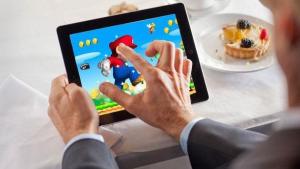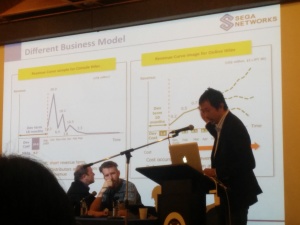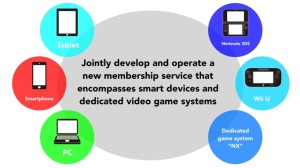Nintendo allies with DeNA – Where is Nintendo heading?
On March 17th, Nintendo and DeNA held a press conference to announced a business and capital alliance between the gaming and smartphone giants. Asides from the fact that capital and company shares were exchanged, the press conference only gave vague ideas about the future of Nintendo and DeNA, alluding to infrastructure changes and possible smartphone uses. Most tech blogs seem to have made only a single conclusion; that Nintendo will be making smartphone games, but is this really the most salient point of the conference?

Who are they?
Nintendo is a familiar name to this blog, so we can gloss over their history. For the most part, Nintendo is a gaming company that is focused on hardware consoles and first party titles. There are a few instances in which Nintendo has strayed from their comfort zone, the most recent is a re-positioning of the company’s goal to “improve quality of life”, alluding to future developments in interactive health products.
The other party to the alliance is a company that the general population may not be so familiar with. DeNA is a large firm that engages in many different branches of technology including eCommerce, social networking, travel, eLearning, etc. The average gamer in North America may not be familiar with the name DeNA, but one of their subsidiaries is Mobage, which is responsible for Rage of Bahamut, Fantasica, Blood Brothers and many other huge mobile games.
But Mobage is just one of DeNA’s branches. Their original business was in creating an auction marketplace in Japan. They leveraged their technology to branch into other businesses that require an online presence. Because they started with a marketplace, they developed competences in networking solutions and electronic payments. It is easy to compare them to Amazon which also branched out from an unlikely beginning.
Why smartphone games and why not?
The jump that many tech blogs are making is that DeNA’s very visible branch in North America is Mobage, and it happens to be in the same line of business as Nintendo. Naturally, the response to an alliance must be that Nintendo and Mobage will work together to create mobile games or perhaps for Nintendo to start publishing Mobage games on their platform. It’s quite easy to rule out the second. For Mobage to begin publishing games on Nintendo platforms, it hardly needs a strategic alliance and an exchange of stocks, it could simply apply for a license like every other publisher. Nintendo also has no dire needs to publish DeNA’s games on its platforms.

The much more likely scenario is that Nintendo finally wants to enter the mobile market that has been outgrowing and outpacing both the console and handheld markets for years. In fact, investors have been telling Nintendo to do so for years.
Yet Nintendo has resisted for as long as there has been calls to move to smartphones. Nintendo argues that the quality of the games aren’t there, that the players aren’t there and the the value isn’t there. As a gamer, I side with their arguments. Investors are only looking at the short term gains of re-releasing classics like Pokemon Blue on smartphones. Without a doubt, those games will sell incredibly well and make some quick profits. But the long term effects on Nintendo’s brand will be forever damaged.
Nintendo’s IPs are a mark of quality. Releasing games on the mobile platform will force Nintendo to make choices that may dilute the quality of the games. The truth is that the mobile arena is very different from the consoles. Nintendo has only very minimally began using DLCs and freemium games on consoles and it is clear that they are trying to fight against it. But when thrust into the mobile market where users only intend to pay $1 or less, they may be forced to resort to tactics that they’ve been trying to avoid. The creation of new freemium games and other compromises is a slippery slope.

The quality will also be compromised simply because video games on mobile devices are differently structured. Shorter play times and different audiences will again push Nintendo to make tough decisions. Lastly, pricing has been an issue. It simply isn’t profitable to put an AAA title on the app store for 99 cents, and pricing games at $14.99 on the app store might not sell.
Where is Nintendo going?
Nintendo has made it clear in the past that they did not want to dilute its brand by making mobile games. Teaming up with DeNA seems to contradict this very fact, but they have explicitly stated that they do not intend to port over games. Most likely, they will begin making small applications to supplement their full games on the console, as companions or mini games. Nintendo has also been doing many crossovers lately, it is also possible to see a few of their IPs being leveraged in Mobage games as cameos or guest appearances rather than a full fledged game.

Nintendo has seemingly reversed its position. But I believe this is merely a necessary cost for the much bigger issue that others are ignoring. Nintendo is looking at DeNA for an online infrastructure, not for their mobile gaming division. Taking a 10% stake of DeNA means they can leverage much more than just Mobage, they are looking at the other branches to develop what Nintendo has been severely lacking against its competition: online services. With Club Nintendo written off for a new and improved system, and minor changes to the archaic friend code system, we can see that Nintendo is looking to improve in this area. The first steps are quite obvious, Nintendo is so severely lacking that a regular username system would probably be the very first step. Then tying digital downloads to accounts rather than hardware, and possibly messenger services, social networks, etc. I think that this is the compromise that Nintendo has struck. It gave away a few of its IPs for DeNA’s use in exchange for DeNA’s superior technology.

Leave a Reply